
1.Begin 2.Lie 3.Stigma 4.First Love 5.Reflection 6.Mama 7.Awake. To the unknowing public these just seem like words that have nothing to do with each other, but for those who thrive on the life source that is Kpop, these seven subjects are titles to seven solo tracks whose messages plagued the minds of all who watched them with innumerable questions. These seven solo tracks come from an album that has taken not just Korea but the world by storm.
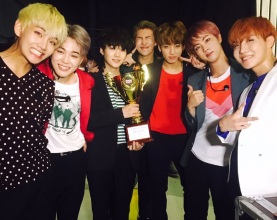
Bangtan Sonyeodan (BTS) has been capturing the attention of music lovers around the world with the release of their newest album WINGS on Sunday, October 10, 2016.With the release of WINGS, came a series of record-breaking feats. After dropping the album and music video for their title track, “Blood Sweat & Tears,” on, Sunday. BTS’ record-breaking streak was officially sparked.

The title track, “Blood Sweat & Tears”, was written with reggae, moombahton, and trap influences but still, manages to capture BTS’ signature style. Within hours of its music video release, “Blood Sweat and Tears” broke the YouTube video view record for most viewed video in the first 24 hours with 6.34 million views. And, BTS only continued to claim record after record. They were the second Kpop performers, after PSY, to break 10 million views. Today the “Blood, Sweat, & Tears” music video already has over 83 million views. The WINGS album also managed to sweep music charts across the globe from South Korea to South America.

What is the meaning behind such a successful album? BTS’ leader Kim Namjoon (Rap Monster) explained the concept of the album as the temptations of growing up, “the harder a temptation is to resist, the more you think about it and vacillate. That uncertainty is part of the process of growing. [Blood Sweat & Tears] is a song that shows how one thinks, chooses, and grows.” Lead Rapper and assistant composer/producer Min Yoongi (Suga) added, “the wings pictured in the music video are one of the symbols of growth, the song relays an optimistic determination to use our wings to go far, even if we are met with temptations in life.”
Not only did BTS break YouTube music records, WINGS broke Kpop history by ranking 1st place on the iTunes Top Album Chart immediately after it was released, setting the record as the first Kpop artists to ever place 1st with a full-length album on the Top Album Chart. And for the first time in history, all fifteen tracks from the album place spots, 1st through 15th on the iTunes K-Pop Chart,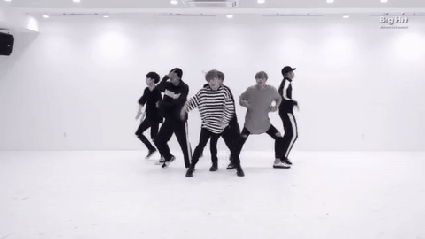 deeming the event in history as “Lining Up.” BTS set records all over the globe on charts in American, Brazil, Chile, Denmark, Finland, Hong Kong, New Zealand, Russia, Singapore, Sweden and more for a total of 27 countries.
deeming the event in history as “Lining Up.” BTS set records all over the globe on charts in American, Brazil, Chile, Denmark, Finland, Hong Kong, New Zealand, Russia, Singapore, Sweden and more for a total of 27 countries.
Several world-famous music channels, such as FuseTV, I Heart Radio and more all sent out praise for the group. The very next day after the album’s release, Billboard wrote an article with the title “BTS Soars to New Heights With ‘Blood Sweat & Tears’”. The article claimed “2016 has been a big year for BTS”, and described how each member has grown as musicians through their 2nd full-length album. Billboard cited the group as a key player in spreading K-Pop all throughout the world
Whether people’s attention is held hostage by story behind BTS’ album/songs, the extraordinary video quality, the difficult choreography that’s made to look simple, captivating vocals, the hypnosis of how strange the whole Kpop thing is or any number of other things, BTS has made it clear that they are not here to be just any other idols. There’s a saying when it rains, it pours; BTS are proving themselves to just be the first raindrop in a flood of Noah proportions.
Extras:
- Album lists
- WINGS Gallery
- acoustic videos
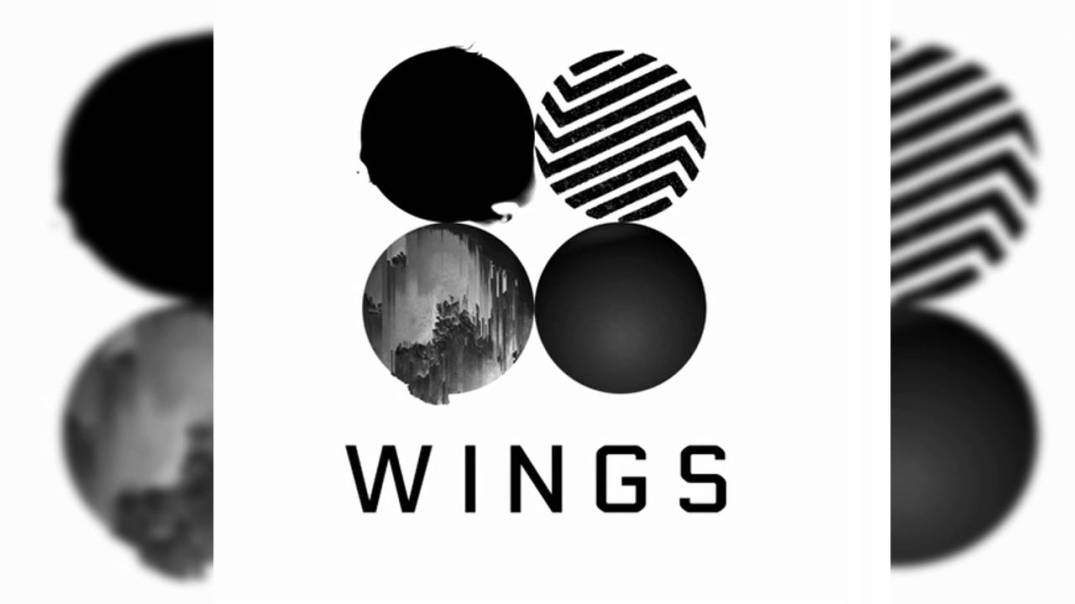

 An “average” training period for trainees is between 2 to 4 years, but it can be several more years or as short as a few months. Jo Kwon, who’s a member of the JYP group 2AM, was a trainee for
An “average” training period for trainees is between 2 to 4 years, but it can be several more years or as short as a few months. Jo Kwon, who’s a member of the JYP group 2AM, was a trainee for


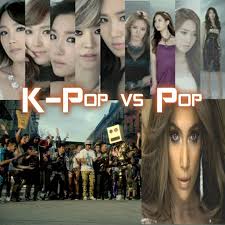 them, or maybe can’t stand, as some have put it the quote, “cheesy pop style of music” (granted Kpop isn’t the typical style of pop it’s much closer to hip-hop, but the
them, or maybe can’t stand, as some have put it the quote, “cheesy pop style of music” (granted Kpop isn’t the typical style of pop it’s much closer to hip-hop, but the

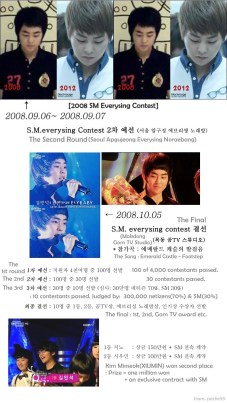 Winning a Sponsored Contest (talent/luck).
Winning a Sponsored Contest (talent/luck).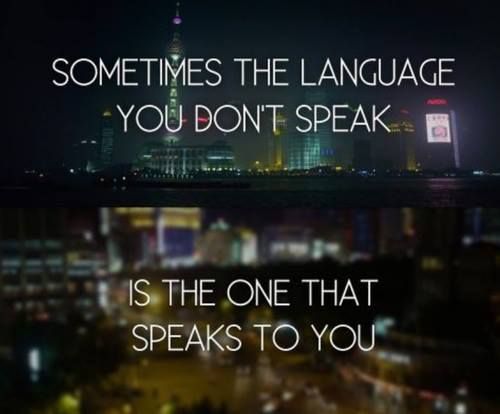
 Seoul. Considering most of these same people were singing along to PSY’s “Gangnam Style” it seems a little funny that they are so insulted by K-fans participating in something that’s not in English. People don’t seem to understand that just because learning other languages, especially ones like Korean, Thai, or Vietnamese, aren’t stressed in our school systems, it doesn’t mean that learning foreign languages isn’t stressed in other countries. According to the
Seoul. Considering most of these same people were singing along to PSY’s “Gangnam Style” it seems a little funny that they are so insulted by K-fans participating in something that’s not in English. People don’t seem to understand that just because learning other languages, especially ones like Korean, Thai, or Vietnamese, aren’t stressed in our school systems, it doesn’t mean that learning foreign languages isn’t stressed in other countries. According to the The same thing applies with Kpop and Kdramas. Firstly, there is, in most fans’ opinions, the obvious comeback of subtitles and translations. There are multiple sites dedicated to
The same thing applies with Kpop and Kdramas. Firstly, there is, in most fans’ opinions, the obvious comeback of subtitles and translations. There are multiple sites dedicated to
 and some Kpop idols may only be half Korean and some aren’t Korean at all, so they spend time learning Korean. For example, the Kpop group
and some Kpop idols may only be half Korean and some aren’t Korean at all, so they spend time learning Korean. For example, the Kpop group 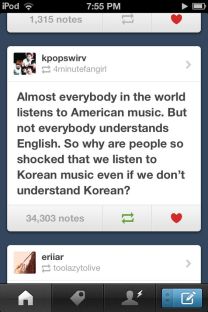 A foreign fan may not understand any part of the language, but they can see the context clues in music videos, the passionate expressions on performers’ faces, and most of all they can really feel the emotion a performer is singing with. “I Really Didn’t Know” is known as a classic because of the sad love story it tells dating back to when China invaded South Korea, and lovers could only call each other with a whistle. The song tells the story from the perspective of a woman whose lover has either been called off to war or died in the war, yet she can still hear the sound of whistling because she never thought he would leave her (perhaps permanently in death), “[she] honestly, really didn’t know.” This song was
A foreign fan may not understand any part of the language, but they can see the context clues in music videos, the passionate expressions on performers’ faces, and most of all they can really feel the emotion a performer is singing with. “I Really Didn’t Know” is known as a classic because of the sad love story it tells dating back to when China invaded South Korea, and lovers could only call each other with a whistle. The song tells the story from the perspective of a woman whose lover has either been called off to war or died in the war, yet she can still hear the sound of whistling because she never thought he would leave her (perhaps permanently in death), “[she] honestly, really didn’t know.” This song was